Feature
The 11 dumbest things about Tron Legacy
Movie Feature
Ali
16th December 2010
I didn't hate Tron Legacy upon first seeing it - I'm a movie magpie, constantly awed by bright and shiny things - but the more I think about it in retrospect, the more I realise I had been witness to a truly epic logic fail: a spazzy cinematic Hindenberg going down in neon flames. Behold: the most ridiculous aspects of the most ridiculous film of 2010.
Disclaimer: I am fully aware that a film about a man who gets trapped in his computer doesn't exactly lend itself to realistic debate. However, even with this fairly gigantic suspension of disbelief, Tron Legacy still manages to fartsplode itself into a black hole of dumb. Warning: this article may reduce your IQ - and major spoilers await.
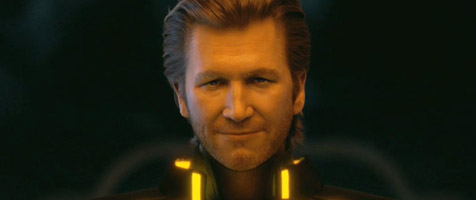
If you're not up to speed on the plot of Tron Legacy - and I do recommend you see the movie before reading this feature - then here's the thrust of the story in a nutshell. Kevin Flynn (Jeff Bridges) created a computerised universe called The Grid in the first movie and creates a duplicate digital version of himself called Clu to clean the place up. Inevitably, Young CGI Jeff Bridges turns on Old Actual Jeff Bridges, traps him in The Grid then plots his escape into the real world by paging his son, Sam (Garrett Hedlund) and luring him in.
What could go wrong? All Clu has to do is send a page to Bruce Boxleitner's character, Alan Bradley, assuming Bradley hasn't changed his number in 20 years (or given up and bought a mobile phone), who must then be relied upon to pass the message on to Sam, assuming he's still alive and still in touch with Bradley.
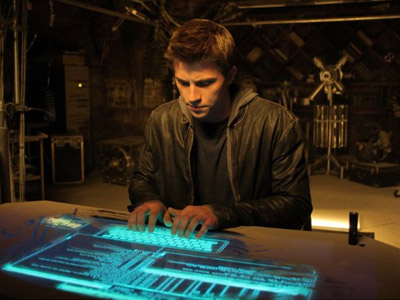
Then it's simply a case of relying on Sam to act on the page, go to his father's decrepit arcade, play the Tron arcade machine, find the secret door to the office, hope he's computer literate enough to use an ancient, 20 year-old desktop AND enter the correct command to fire the laser which will transport him to The Grid. And not, say, whack the whole lot on eBay or chuck it in a skip.
Foolproof!

While we're picking holes in Clu's devious plot, can anyone tell us exactly how a computer program can send out a digital signal into the real world and page a human being? Clu's MO is to free himself from the shackles of ones and zeroes and take his army to the physical world, for some reason - but as he's already shown with the page, he's already capable of sending digital information from within The Grid to the outside world.
Why stop at a page? Why not a voice message? Or wear a fake beard and send a picture message directly to Sam, claiming to be his actual Dad? Or, y'know, if you're capable of transmitting a digital signal from one plane to another, why not just email yourself to Earth as an attachment? Note: none of these suggestions are any dumber than what happens in the actual film - it's a fairly major plot point that's never explained. Tsk.
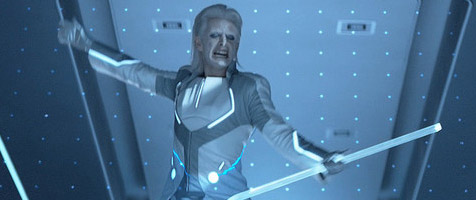
While searching for answers in The Grid, Sam is sent to see Michael Sheen's flamboyant nightclub owner and part-time David Bowie lookalike, Castor, who knows the whereabouts of a wise program called Zeus. So, off he trots to the End Of Line club, without once even asking why computer programs would need a nightclub in the first place. To defrag after a hard day's processing? God only knows.
Upon arriving at the club (without paying the required 99 Euros one would usually need to see Daft Punk live), we're left picking up our jaws off the floor after a classic bit of cinematic misdirection that's almost Keyser Soze-ian in its delivery. You see, Castor is Zeus. Oh. My. Fucking. ZOMG. Tyler Durden, you just got pwned.
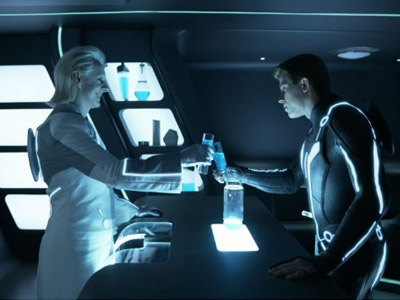
Except... hang on, what? What's the point of that? You mean, the character you told me to go and see who could apparently tell me where another character was, was actually just the character I needed to see in the first place? That's not a twist, that's a missing page in the script! The Castor/Zeus switcheroo makes absolutely no difference to the story whatsoever, aside from giving Michael Sheen further opportunity to release roping arcs of digi-jizz all over the patrons of his club.
I remember another pompous nightclub owner-cum-fixer in a sequel set in a digital world: his name was The Merovingian, and I think we all know how that turned out.

Sam Flynn, son of Old Actual Jeff Bridges, is the heir to the ENCOM fortune and the hero of Tron Legacy: the roguish bad boy who travels to a faraway land to rescue an ancient artefact, defeat the villain and get the girl, like in every sci-fi-fantasy ever. It's a pretty thankless part, and Hedlund is as bland as the last chocolates in a box of Roses.
That's no big deal though, as that kind of passive part is a staple of the fantasy genre: the protagonist whose only job is to ask questions and be ferried around from set-piece to set-piece, acting all confused. No, our problem is why they made Sam such a titanic douchebag from the outset.

In the pre-Grid sequence that opens the movie, we learn that Sam is a hacker. Fair enough. Actually, he's not just a hacker, he's a militant hacker, who breaks into the skyscraper HQ of one of the world's biggest, most financially successful technology companies and manages to upload a virus into the mainframe, avoids certain death by a trigger-happy security guard and then base jumps off the roof of the fucking building. Naturally, he lands on the roof of a cab and ends up in a high-tension face-off with armed police. Oh, and did I mention he rides a motorbike and lives in a garage?
There is literally no one on Earth who can create a super-virus, ride a motorbike and base jump off a building, with the exception of this guy.

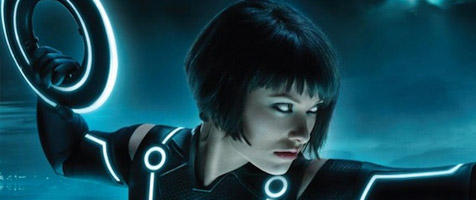
I had Olivia Wilde's character, Quorra, down as the requisite bit of skirt - the token feisty female that sad-acts like Tron Guy have been gagging to see in The Grid since 1982. However, the moment her back-story is revealed - she's an organically created program called an ISO that grew naturally within the system - is the moment that Tron Legacy staggers dangerously close to Star Wars' 'Midichlorian' territory.
For some reason, even in a fictional computer universe where programs play deadly games of Ultimate Frisbee, a storyline that makes even less sense had to be introduced. Organic material occurring naturally inside a computer? You mean all that grey, furry shit that clogs up my heatsink?

Old Actual Jeff Bridges is in awe of Quorra, and totally not just because she's Olivia Wilde in a rubber cat-suit - because she represents a miracle that could "change science and religion forever" on the outside world. We're led to believe this is because her genetic make-up is malleable and she can easily be repaired by tinkering with her code. Or, in other words, she has a built-in Ctrl-Z capabilites. That doesn't work on humans, trust me - I have enough ex-girlfriends who can testify how much my body needs an 'Undo' function.
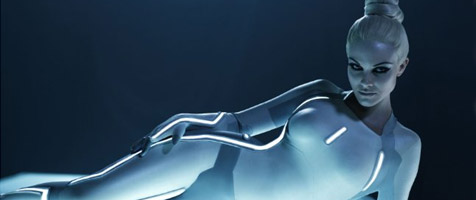
It's sort of taken as read that the personalities inside The Grid are computer programs, some of which have a purpose (guards, barmen, that sort of thing) while others just wander around like stupid strings of pointless computer code. Which function exactly do these useless programs represent? Are they dilapidated MySpace pages? Remnants of Internet Explorer 6? / end computer humour
Case in point: Michael Sheen's club owner, Castor, minces around with all the zeal of a particularly irritating human - he smiles, he snarls, he dances, he probably snorts line after line of digi-coke. However, other programs in The Grid walk around like robots and talk in vocoder speak, like a hungover Cher. While at the arena, token sexy character Siren (pictured) acts like an automaton, then at Castor's club, she's downing glasses of neon blue liquid (complete with - ugh - ice pixels) and spurning the advances of sleazeball programs.
What gives? At one point, Sam bumps into a homeless program. How exactly does a line of code, no matter how unimportant, end up homeless? And, if we're going down that route, shouldn't he be branded with a giant 404 error message?
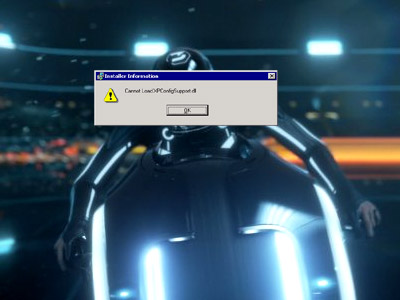
Support Us
Follow Us
Recent Highlights
-
Review: Jackass Forever is a healing balm for our bee-stung ballsack world
Movie Review
-
Review: Black Widow adds shades of grey to the most interesting Avenger
Movie Review
-
Review: Fast & Furious 9 is a bloodless blockbuster Scalextric
Movie Review
-
Review: Wonder Woman 1984 is here to remind you about idiot nonsense cinema
Movie Review
-
Review: Borat Subsequent Moviefilm arrives on time, but is it too little, or too much?
Movie Review
Advertisement
And The Rest
-
Review: The Creator is high-end, low-tech sci-fi with middling ambitions
Movie Review
-
Review: The Devil All The Time explores the root of good ol' American evil
Movie Review
-
Review: I'm Thinking Of Ending Things is Kaufman at his most alienating
Movie Review
-
Review: The Babysitter: Killer Queen is a sequel that's stuck in the past
Movie Review
-
Review: The Peanut Butter Falcon is more than a silly nammm peanut butter
Movie Review
-
Face The Music: The Bill & Ted's Bogus Journey soundtrack is most outstanding
Movie Feature
-
Review: Tenet once again shows that Christopher Nolan is ahead of his time
Movie Review
-
Review: Project Power hits the right beats but offers nothing new
Movie Review
-
Marvel's Cine-CHAT-ic Universe: Captain America: Civil War (2016)
Movie Feature
-
Review: Host is a techno-horror that dials up the scares
Movie Review
